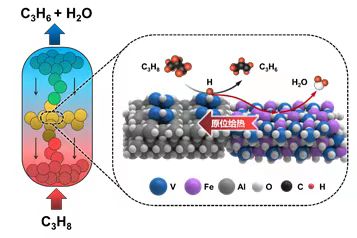A research team from Tianjin University developed a groundbreaking propylene production method with reduced emissions, offering promising prospects for advancing sustainable and environmentally friendly practices in the petrochemical industry. The reported findings appear online in Science on July 28.
Propylene plays a pivotal role in the global petrochemical industry chain and serves as a fundamental chemical feedstock for various downstream products, including plastics, medical supplies, automotive components, and building materials. China currently holds the highest demand and production of propylene globally. However, the existing advanced technology for direct dehydrogenation of propane to propylene requires substantial heat input, leading to high energy consumption and carbon emissions. Additionally, the heavy reliance on imports poses challenges for the domestic petrochemical industry.
Currently, propylene production accounts for approximately 8% and 5% of China's and the global petrochemical industry's carbon emissions, respectively. Efforts are being made to develop sustainable alternatives that reduce carbon emissions while meeting the increasing demand for propylene both domestically and internationally.
Led by Prof. Gong Jinlong, the Energy & Catalysis Adventure Team at Tianjin University developed a reaction system comprised of abundant metal oxides for the dehydrogenation of propane (endothermic). The system efficiently utilizes the heat generated through its selective combustion of the side-product (exothermic) to compensate the heat needed for the overall reaction. Compared to the traditional processes, this new technology can lower the reaction temperature by 30-50 ℃, and reduce the expected energy consumption by 20-30%, leading to a significant decrease in CO2 emissions.
This new technology has been filed multiple national patents and has progressed beyond laboratory research and entered the industrial scale-up stage. It is expected that the wide implementation of this technology may aid to promote a greener, more sustainable petrochemical industry. This will not only help China to achieve its carbon peaking and carbon neutrality goals, but also it will make substantial progress towards mitigating climate change and ensuring a more sustainable future for our planet.

Figure: Propylene production by coupling propane dehydrogenation with selective hydrogen combustion
By Eva Yin






